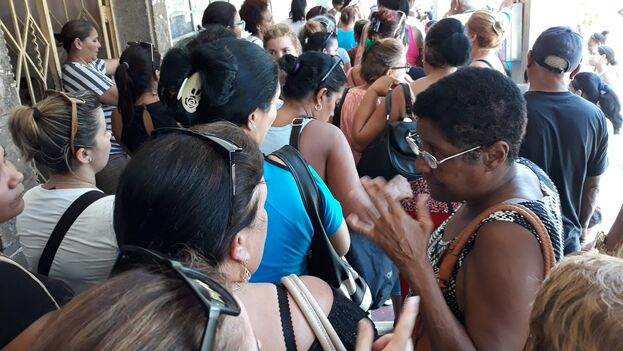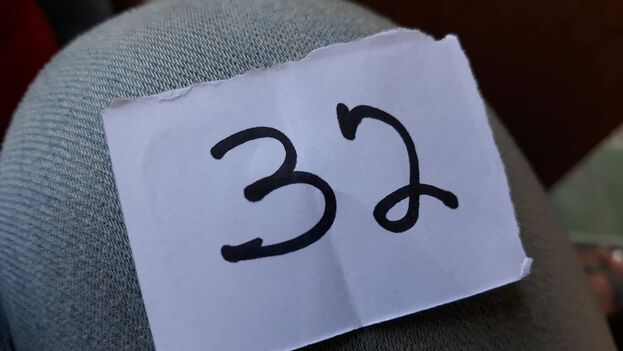
![]() 14ymedio, Luz Escobar, Havana, August 6, 2019 — Enormous lines and annoyance among parents marked this Monday the beginning of the sale of uniforms in the majority of municipalities in the capital. After days of waiting, uncertainty, and misinformation, Plaza de la Revolución, Centro Habana, La Habana Vieja, Regla, La Habana del Este, Guanabacoa, Cerro, and Marianao finally joined the communities of San Miguel del Padrón, Diez de Octubre, La Lisa, Boyeros, Arroyo Naranjo, and el Cotorro, which began the operation last Thursday, and Playa, which was added on Friday.
14ymedio, Luz Escobar, Havana, August 6, 2019 — Enormous lines and annoyance among parents marked this Monday the beginning of the sale of uniforms in the majority of municipalities in the capital. After days of waiting, uncertainty, and misinformation, Plaza de la Revolución, Centro Habana, La Habana Vieja, Regla, La Habana del Este, Guanabacoa, Cerro, and Marianao finally joined the communities of San Miguel del Padrón, Diez de Octubre, La Lisa, Boyeros, Arroyo Naranjo, and el Cotorro, which began the operation last Thursday, and Playa, which was added on Friday.
In a store called La Gloria, chosen for students from Plaza de la Revolución to buy their uniforms, the line began to form on Sunday at four in the afternoon.
“This was madness. Here in the front door of the store there was a little group that had the list. They were drinking rum and making a huge uproar. The parents who were arriving put their names down on the list, got their number, and left, but early in the morning there was even a knife fight and we had to call the police,” says a resident who everyone calls Nena and who carries a thermos of coffee in her hand from which she sells cups to others.

At eight in the morning, an hour before the opening of La Gloria, a crowd was gathered around the building. The list that had been made the previous day included the first hundred people in the line who had in their hands a ticket with a number. As the others arrived they asked “who’s last”* in the line for those “without a ticket” as they arrived.
There are hardly any children in the long line. The majority of the parents have chosen to bring a garment of their child to figure out the size and avoid a bad experience for the children. Those who couldn’t avoid bringing them, on the other hand, passed the time running around, sometimes desperate, going from one side to the other, or asking for water and food.
A slim woman comes in high heels, a business skirt, and a pearl necklace. After five minutes of waiting, leaning on a column, she takes some sandals out of her purse, puts away the heels, takes off the skirt, and remains with some shorts that she was wearing underneath. “Now I’m ready for this,” she says, and she takes off to rest against one of the walls surrounding the front door of the store after putting down a little nylon bag that she takes out of her purse. She gets comfortable, and now she is ready for a long wait.
A few minutes before nine in the morning, the manager of the store arrives and explains in detail the necessary requisites to make the purchase and all of its peculiarities. She warns that they are not yet selling high school uniforms for boys and that the voucher cannot having any corrections. She also asks the parents to carefully read the list of schools that shop there to avoid waiting in line in vain, a moment in which all of the parents check their papers to make sure.
One of the mothers is worried because the part of the voucher that indicates the sex of the student wasn’t very legible. “Here you can see that they wanted to turn an M into an F, so nothing is understood. We can’t accept that this way here,” the employee tells her. “Now you have to go to the municipality education office which is on H and 21 and get another,” she adds, to the annoyance of the woman.
The mother leaves after calling her husband, who picks her up on a motorcycle to right the wrong. She had arrived at the store at five in the morning and was among the first hundred in line, so she didn’t want to lose the opportunity. “There I had to make a big fuss for them to pay attention to me, because nobody is doing anything, but in the end I got a promise from an employee that they would send someone here with new vouchers to exchange,” she says upon returning.
An official from the Ministry of Education finally arrived, in a car and with a folder of papers, as a savior of the parents and not only gave a new voucher to that family but also to others in a similar situation. “They didn’t accept my voucher because it’s written in two different inks, imagine. The teacher’s pen ran out when she was filling out the information and I gave her mine to finish it,” explained a grandmother to the woman from the municipality. “Who would think of making a demand like that?” she complained.
Despite the incidents, the sale began punctually, at nine in the morning. At two tables, placed at the entrance to the store, workers took information from parents, who then passed inside to make the purchase. At the counter two very young girls, with white t-shirts with the face of Che, were in charge of sales, while a boy helped to take out and organize pieces from the storeroom.
At a rate of five minutes per person, at midday some 40 people had already made their purchases. However, the feeling was that it wasn’t advancing, and only after two in the afternoon were they able to organize the second part of the line, those who had no ticket. One of the mothers got everyone in a line and handed out a hundred new numbers to guarantee order and prevent cutting.

At four in the afternoon, after eight hours of waiting, a grandmother sadly came out of the store. “I wasn’t able to buy anything because my grandson is starting first grade and she says that it’s only for the first ones,” explained the woman, who had missed the moment in which the manager had warned of that detail.
“You wait there, that is outrageous, why couldn’t they make an exception for you, an older woman? Now you have to come another day and wait in line, that cannot be,” yelled an older man who was accompanying his son. “I can’t sell to her on that voucher, because later when they do the audit, I’ll be the one with the problems,” explained the manager to the man who, despite everything, managed to extract from her the promise that, when sales to the second group begins, the woman will not have to wait in line again.
After an entire day in line, some parents began to sketch out ideas to solve the yearly disaster in sales of school uniforms. “The best thing would be to get rid of them, let each student come in dark pants and a light sweater and the problem is over,” said a mother. “I’m 41, and in my high school they gave out the uniforms in the school’s storeroom, where they gave you your books. And there were never problems, if they were missing a size they asked for it and it’s done, if they did that now they would get rid of a few problems,” says another.
At eight at night the parents who had come at eight in the morning were coming out with their purchases, although some no longer found the size they were looking for. Those who had arrived at nine or ten in the morning still had two hours of waiting ahead of them. The store was selling up until a few minutes before midnight. Today, in front of the store, the view is the same, hundreds of parents waiting to buy school uniforms for their children.
*Translator’s note: In Cuba people join lines by asking “who’s last” and then they know who is the person ahead of them. Once the next person comes and they identify themselves as “last” they can wander off, sit down, visit with friends and so on without losing their place.
Translated by: Sheilagh Herrera
______________________
The 14ymedio team is committed to serious journalism that reflects the reality of deep Cuba. Thank you for joining us on this long road. We invite you to continue supporting us, but this time by becoming a member of 14ymedio. Together we can continue to transform journalism in Cuba.
